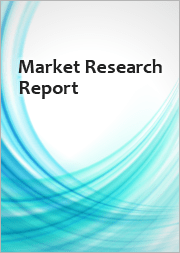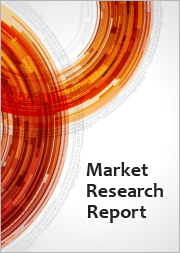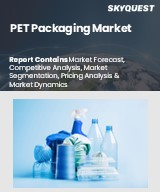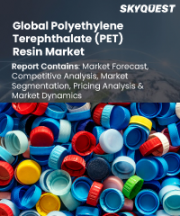
|
시장보고서
상품코드
1841876
재활용 PET 플레이크 시장 : 세계 산업 규모, 점유율, 동향, 기회, 예측 - 제품별(투명, 착색), 최종 용도별(섬유, 시트&필름, 식품 및 음료, 보틀&용기, 기타), 지역별, 경쟁별(2020-2030년)Recycled PET Flakes Market - Global Industry Size, Share, Trends, Opportunity, and Forecast, Segmented By Product (Clear, Colored), By End Use (Fiber, Sheet & Film, Food & Beverage, Bottles & Containers, Others), By Region & Competition, 2020-2030F |
||||||
재활용 PET 플레이크 시장의 2024년 시장 규모는 130억 4,000만 달러로 평가되었으며, 2030년에는 CAGR 6.90%로 192억 7,000만 달러에 달할 것으로 예측됩니다.
| 시장 개요 | |
|---|---|
| 예측 기간 | 2026-2030년 |
| 시장 규모 : 2024년 | 130억 4,000만 달러 |
| 시장 규모 : 2030년 | 192억 7,000만 달러 |
| CAGR : 2025-2030년 | 6.90% |
| 급성장 부문 | 착색 |
| 최대 시장 | 아시아태평양 |
세계 재생 PET(폴리에틸렌 테레프탈레이트) 플레이크 시장은 환경에 대한 인식이 높아지고 포장, 섬유, 자동차 등의 산업에서 지속가능한 소재에 대한 수요가 증가함에 따라 강력한 성장세를 보이고 있습니다. 재활용 PET 플레이크는 소비자들이 사용한 PET 병과 용기를 파쇄 및 세척하여 생산되며, 범용성이 높고 비용 효율성이 높아 병, 섬유, 시트, 스트랩 제조에 선호되고 있습니다. 이 시장은 플라스틱 폐기물과 탄소발자국을 줄이기 위해 재활용 가능한 재료를 우선적으로 사용하는 순환 경제 원칙으로 전 세계적으로 전환하는 추세에 힘입어 성장하고 있습니다. 음료 및 식품 포장 분야는 친환경 제품을 원하는 소비자의 요구에 부응하기 위해 기업들이 재활용 PET 플레이크를 채택하고 있어 크게 기여하고 있습니다.
재활용과 지속가능성을 촉진하는 정부의 노력과 규제는 성장을 가능하게 하는 중요한 요소입니다. 예를 들어, 유럽연합(EU)의 순환경제 행동계획은 플라스틱 포장재 재활용률 향상을 장려하고 있으며, 재활용 PET 플레이크의 채택을 촉진하고 있습니다. 아시아태평양은 중국, 인도 등의 국가에서 높은 산업 생산량과 PET병 회수 시스템으로 인해 시장을 독점하고 있습니다. 북미와 유럽도 선진화된 재활용 인프라와 기업의 지속가능성 노력에 힘입어 중요한 역할을 하고 있습니다. 원료의 품질이 안정적이지 않고, 처리비용이 높은 등의 문제점이 있지만, 재활용 기술의 혁신과 지속가능한 제품에 대한 소비자의 선호도가 높아지면서 시장을 견인하고 있습니다. 2020-2030년 예측 기간 동안 산업계가 세계 지속가능성 목표에 따라 다양한 용도에 재활용 PET 플레이크를 활용함에 따라 지속적인 성장이 예상됩니다.
시장 촉진요인
지속가능한 포장 솔루션에 대한 수요 증가
주요 시장 과제
일관성 없는 원자재 품질
주요 시장 동향
섬유 응용 분야에서의 사용 증가
목차
제1장 개요
제2장 조사 방법
제3장 주요 요약
제4장 혼란 : 분쟁, 팬데믹, 무역장벽
제5장 세계의 재활용 PET 플레이크 시장 전망
- 시장 규모 및 예측
- 금액·수량별
- 시장 점유율과 예측
- 제품별(투명, 착색)
- 용도별(섬유, 시트·필름, 식품 및 음료 보틀·용기, 기타)
- 지역별
- 기업별(2024)
- 시장 맵
- 제품별
- 최종 용도별
- 지역별
제6장 북미의 재활용 PET 플레이크 시장 전망
- 시장 규모 및 예측
- 시장 점유율과 예측
- 북미 : 국가별 분석
- 미국
- 멕시코
- 캐나다
제7장 유럽의 재활용 PET 플레이크 시장 전망
- 시장 규모 및 예측
- 시장 점유율과 예측
- 유럽 : 국가별 분석
- 프랑스
- 독일
- 영국
- 스페인
- 이탈리아
제8장 아시아태평양의 재활용 PET 플레이크 시장 전망
- 시장 규모 및 예측
- 시장 점유율과 예측
- 아시아태평양 : 국가별 분석
- 중국
- 인도
- 한국
- 일본
- 싱가포르
제9장 남미의 재활용 PET 플레이크 시장 전망
- 시장 규모 및 예측
- 시장 점유율과 예측
- 남미 : 국가별 분석
- 브라질
- 아르헨티나
제10장 중동 및 아프리카의 재활용 PET 플레이크 시장 전망
- 시장 규모 및 예측
- 시장 점유율과 예측
- 중동 및 아프리카 : 국가별 분석
- 남아프리카공화국
- 사우디아라비아
- 아랍에미리트
제11장 시장 역학
- 성장 촉진요인
- 과제
제12장 시장 동향과 발전
- 제품 출시
- 인수합병
- 기술적 진보
제13장 세계의 재활용 PET 플레이크 시장 : SWOT 분석
제14장 가격 분석
제15장 Porter's Five Forces 분석
- 업계내 경쟁
- 신규 참여의 가능성
- 공급업체의 능력
- 고객의 능력
- 대체품의 위협
제16장 경쟁 구도
- PolyQuest, Inc.
- Polyvim LLC
- Gravita India Ltd.
- JB Ecotex Limited
- Plastipak Industries Inc.
- Clear Path Recycling LLC.
- Indorama Ventures Public Company Limited.
- Verdeco Recycling Inc.
- Loop Industries, Inc.
- EvergreenTogether
제17장 전략적 제안
제18장 조사 회사 소개 및 면책사항
KSM 25.10.24Recycled PET Flakes Market was valued at USD 13.04 Billion in 2024 and is expected to reach USD 19.27 billion by 2030 with a CAGR of 6.90%.
| Market Overview | |
|---|---|
| Forecast Period | 2026-2030 |
| Market Size 2024 | USD 13.04 Billion |
| Market Size 2030 | USD 19.27 Billion |
| CAGR 2025-2030 | 6.90% |
| Fastest Growing Segment | Coloured |
| Largest Market | Asia Pacific |
The global recycled PET (polyethylene terephthalate) flakes market is experiencing robust growth, driven by heightened environmental awareness and the increasing demand for sustainable materials across industries such as packaging, textiles, and automotive. Recycled PET flakes, produced by shredding and cleaning post-consumer PET bottles and containers, are highly versatile and cost-effective, making them a preferred choice for manufacturing bottles, fibers, sheets, and strapping. The market is propelled by the global shift toward circular economy principles, with industries prioritizing recyclable materials to reduce plastic waste and carbon footprints. The food and beverage packaging sector is a significant contributor, as companies adopt recycled PET flakes to meet consumer demand for eco-friendly products.
Government initiatives and regulations promoting recycling and sustainability are key growth enablers. For instance, the European Union's Circular Economy Action Plan encourages higher recycling rates for plastic packaging, boosting the adoption of recycled PET flakes. The Asia-Pacific region dominates the market, driven by high industrial output and PET bottle collection systems in countries like China and India. North America and Europe also play significant roles, supported by advanced recycling infrastructure and corporate sustainability commitments. Despite challenges such as inconsistent raw material quality and high processing costs, the market is bolstered by innovations in recycling technologies and increasing consumer preference for sustainable products. The forecast period of 2020-2030F is expected to see sustained growth as industries align with global sustainability goals and leverage recycled PET flakes for diverse applications.
Key Market Drivers
Rising Demand for Sustainable Packaging Solutions
The global push for sustainable packaging solutions is a primary driver of the recycled PET flakes market, particularly in the food and beverage sector. Recycled PET flakes are widely used to produce bottles, containers, and trays, offering environmental benefits and cost savings compared to virgin PET. The increasing consumer preference for eco-friendly products has prompted major companies to commit to higher recycled content in their packaging. For example, leading beverage companies have pledged to incorporate significant recycled PET content in their bottles, aligning with global sustainability goals. This trend is supported by regulations such as the European Union's Single-Use Plastics Directive, which mandates increased recycling rates for plastic packaging.
The growth of e-commerce and retail sectors has further amplified demand for sustainable packaging, as brands seek to reduce their carbon footprints while maintaining product integrity. The global packaged food market is expanding rapidly, particularly in Asia-Pacific, where urbanization and rising disposable incomes drive demand for eco-friendly packaging. Recycled PET flakes offer advantages like transparency, strength, and recyclability, making them ideal for food-grade applications. Manufacturers are investing in advanced recycling technologies to ensure high-quality flakes that meet stringent safety standards, further propelling market growth. This demand for sustainable packaging is expected to continue driving the recycled PET flakes market throughout the forecast period.
Key Market Challenges
Inconsistent Raw Material Quality
The recycled PET flakes market faces challenges due to the inconsistent quality of post-consumer PET raw materials. Variations in the composition, contamination levels, and color of collected PET bottles can affect the quality of recycled flakes, limiting their suitability for high-value applications like food-grade packaging. Contaminants such as labels, adhesives, and non-PET plastics require advanced sorting and cleaning processes, which increase production costs and complexity.
The lack of standardized collection systems in many regions, particularly in developing economies, exacerbates this issue, leading to supply chain inefficiencies. Manufacturers must invest in sophisticated cleaning and sorting technologies to ensure consistent flake quality, which can strain profit margins, especially for smaller players. Addressing this challenge requires improvements in waste management infrastructure, consumer education on proper recycling practices, and technological advancements to enhance raw material processing.
Key Market Trends
Growing Use in Textile Applications
The recycled PET flakes market is witnessing a growing trend toward their use in textile applications, driven by the demand for sustainable fabrics in the fashion and home furnishing industries. Recycled PET flakes are processed into polyester fibers and yarns, used to manufacture apparel, carpets, and upholstery. This trend is fueled by consumer preference for eco-friendly products and corporate commitments to sustainability, with brands increasingly incorporating recycled PET fibers into their products.
The Asia-Pacific region, a hub for textile manufacturing, is leading this trend, with countries like China and India expanding their production of recycled PET fibers. Manufacturers are investing in advanced spinning technologies to improve the quality and performance of these fibers, ensuring they meet industry standards. This trend is expected to drive market growth as the textile industry continues to prioritize sustainability.
Key Market Players
- PolyQuest, Inc.
- Polyvim LLC
- Gravita India Ltd.
- JB Ecotex Limited
- Plastipak Industries Inc.
- Clear Path Recycling LLC.
- Indorama Ventures Public Company Limited.
- Verdeco Recycling Inc.
- Loop Industries, Inc.
- EvergreenTogether
Report Scope:
In this report, global Recycled PET Flakes market has been segmented into the following categories, in addition to the industry trends, which have also been detailed below:
Recycled PET Flakes Market, By Product:
- Clear
- Colored
Recycled PET Flakes Market, By End Use:
- Fiber
- Sheet & Film
- Food & Beverage
- Bottles & Containers
- Others
Recycled PET Flakes Market, By Region:
- North America
- United States
- Mexico
- Canada
- Europe
- France
- Germany
- United Kingdom
- Spain
- Italy
- Sweden
- Asia-Pacific
- China
- India
- South Korea
- Japan
- Singapore
- South America
- Brazil
- Argentina
- Middle East & Africa
- South Africa
- Saudi Arabia
- UAE
Competitive landscape
Company Profiles: Detailed analysis of the major companies present in the global Recycled PET Flakes market.
Available Customizations:
With the given market data, TechSci Research offers customizations according to a company's specific needs. The following customization options are available for the report:
Company Information
- Detailed analysis and profiling of additional market players (up to five).
Table of Contents
1. Product Overview
- 1.1. Market Definition
- 1.2. Scope of the Market
- 1.2.1. Markets Covered
- 1.2.2. Years Considered for Study
- 1.2.3. Key Market Segmentations
2. Research Methodology
- 2.1. Objective of the Study
- 2.2. Baseline Methodology
- 2.3. Key Industry Partners
- 2.4. Major Association and Secondary Sources
- 2.5. Forecasting Methodology
- 2.6. Data Triangulation & Validation
- 2.7. Assumptions and Limitations
3. Executive Summary
- 3.1. Overview of the Market
- 3.2. Overview of Key Market Segmentations
- 3.3. Overview of Key Market Players
- 3.4. Overview of Key Regions/Countries
- 3.5. Overview of Market Drivers, Challenges, Trends
4. Disruptions: Conflicts, Pandemics, and Trade Barriers
5. Global Recycled PET Flakes Market Outlook
- 5.1. Market Size & Forecast
- 5.1.1. By Value & Volume
- 5.2. Market Share & Forecast
- 5.2.1. By Product (Clear, Colored),
- 5.2.2. By End Use (Fiber, Sheet & Film, Food & Beverage Bottles & Containers, Others)
- 5.2.3. By Region
- 5.2.4. By Company (2024)
- 5.3. Market Map
- 5.3.1. By Product
- 5.3.2. By End Use
- 5.3.3. By Region
6. North America Recycled PET Flakes Market Outlook
- 6.1. Market Size & Forecast
- 6.1.1. By Value & Volume
- 6.2. Market Share & Forecast
- 6.2.1. By Product
- 6.2.2. By End Use
- 6.2.3. By Country
- 6.3. North America: Country Analysis
- 6.3.1. United States Recycled PET Flakes Market Outlook
- 6.3.1.1. Market Size & Forecast
- 6.3.1.1.1. By Value & Volume
- 6.3.1.2. Market Share & Forecast
- 6.3.1.2.1. By Product
- 6.3.1.2.2. By End Use
- 6.3.1.1. Market Size & Forecast
- 6.3.2. Mexico Recycled PET Flakes Market Outlook
- 6.3.2.1. Market Size & Forecast
- 6.3.2.1.1. By Value & Volume
- 6.3.2.2. Market Share & Forecast
- 6.3.2.2.1. By Product
- 6.3.2.2.2. By End Use
- 6.3.2.1. Market Size & Forecast
- 6.3.3. Canada Recycled PET Flakes Market Outlook
- 6.3.3.1. Market Size & Forecast
- 6.3.3.1.1. By Value & Volume
- 6.3.3.2. Market Share & Forecast
- 6.3.3.2.1. By Product
- 6.3.3.2.2. By End Use
- 6.3.3.1. Market Size & Forecast
- 6.3.1. United States Recycled PET Flakes Market Outlook
7. Europe Recycled PET Flakes Market Outlook
- 7.1. Market Size & Forecast
- 7.1.1. By Value & Volume
- 7.2. Market Share & Forecast
- 7.2.1. By Product
- 7.2.2. By End Use
- 7.2.3. By Country
- 7.3. Europe: Country Analysis
- 7.3.1. France Recycled PET Flakes Market Outlook
- 7.3.1.1. Market Size & Forecast
- 7.3.1.1.1. By Value & Volume
- 7.3.1.2. Market Share & Forecast
- 7.3.1.2.1. By Product
- 7.3.1.2.2. By End Use
- 7.3.1.1. Market Size & Forecast
- 7.3.2. Germany Recycled PET Flakes Market Outlook
- 7.3.2.1. Market Size & Forecast
- 7.3.2.1.1. By Value & Volume
- 7.3.2.2. Market Share & Forecast
- 7.3.2.2.1. By Product
- 7.3.2.2.2. By End Use
- 7.3.2.1. Market Size & Forecast
- 7.3.3. United Kingdom Recycled PET Flakes Market Outlook
- 7.3.3.1. Market Size & Forecast
- 7.3.3.1.1. By Value & Volume
- 7.3.3.2. Market Share & Forecast
- 7.3.3.2.1. By Product
- 7.3.3.2.2. By End Use
- 7.3.3.1. Market Size & Forecast
- 7.3.4. Spain Recycled PET Flakes Market Outlook
- 7.3.4.1. Market Size & Forecast
- 7.3.4.1.1. By Value & Volume
- 7.3.4.2. Market Share & Forecast
- 7.3.4.2.1. By Product
- 7.3.4.2.2. By End Use
- 7.3.4.1. Market Size & Forecast
- 7.3.5. Italy Recycled PET Flakes Market Outlook
- 7.3.5.1. Market Size & Forecast
- 7.3.5.1.1. By Value & Volume
- 7.3.5.2. Market Share & Forecast
- 7.3.5.2.1. By Product
- 7.3.5.2.2. By End Use
- 7.3.5.1. Market Size & Forecast
- 7.3.1. France Recycled PET Flakes Market Outlook
8. Asia-Pacific Recycled PET Flakes Market Outlook
- 8.1. Market Size & Forecast
- 8.1.1. By Value & Volume
- 8.2. Market Share & Forecast
- 8.2.1. By Product
- 8.2.2. By End Use
- 8.2.3. By Country
- 8.3. Asia-Pacific: Country Analysis
- 8.3.1. China Recycled PET Flakes Market Outlook
- 8.3.1.1. Market Size & Forecast
- 8.3.1.1.1. By Value & Volume
- 8.3.1.2. Market Share & Forecast
- 8.3.1.2.1. By Product
- 8.3.1.2.2. By End Use
- 8.3.1.1. Market Size & Forecast
- 8.3.2. India Recycled PET Flakes Market Outlook
- 8.3.2.1. Market Size & Forecast
- 8.3.2.1.1. By Value & Volume
- 8.3.2.2. Market Share & Forecast
- 8.3.2.2.1. By Product
- 8.3.2.2.2. By End Use
- 8.3.2.1. Market Size & Forecast
- 8.3.3. South Korea Recycled PET Flakes Market Outlook
- 8.3.3.1. Market Size & Forecast
- 8.3.3.1.1. By Value & Volume
- 8.3.3.2. Market Share & Forecast
- 8.3.3.2.1. By Product
- 8.3.3.2.2. By End Use
- 8.3.3.1. Market Size & Forecast
- 8.3.4. Japan Recycled PET Flakes Market Outlook
- 8.3.4.1. Market Size & Forecast
- 8.3.4.1.1. By Value & Volume
- 8.3.4.2. Market Share & Forecast
- 8.3.4.2.1. By Product
- 8.3.4.2.2. By End Use
- 8.3.4.1. Market Size & Forecast
- 8.3.5. Singapore Recycled PET Flakes Market Outlook
- 8.3.5.1. Market Size & Forecast
- 8.3.5.1.1. By Value & Volume
- 8.3.5.2. Market Share & Forecast
- 8.3.5.2.1. By Product
- 8.3.5.2.2. By End Use
- 8.3.5.1. Market Size & Forecast
- 8.3.1. China Recycled PET Flakes Market Outlook
9. South America Recycled PET Flakes Market Outlook
- 9.1. Market Size & Forecast
- 9.1.1. By Value & Volume
- 9.2. Market Share & Forecast
- 9.2.1. By Product
- 9.2.2. By End Use
- 9.2.3. By Country
- 9.3. South America: Country Analysis
- 9.3.1. Brazil Recycled PET Flakes Market Outlook
- 9.3.1.1. Market Size & Forecast
- 9.3.1.1.1. By Value & Volume
- 9.3.1.2. Market Share & Forecast
- 9.3.1.2.1. By Product
- 9.3.1.2.2. By End Use
- 9.3.1.1. Market Size & Forecast
- 9.3.2. Argentina Recycled PET Flakes Market Outlook
- 9.3.2.1. Market Size & Forecast
- 9.3.2.1.1. By Value & Volume
- 9.3.2.2. Market Share & Forecast
- 9.3.2.2.1. By Product
- 9.3.2.2.2. By End Use
- 9.3.2.1. Market Size & Forecast
- 9.3.1. Brazil Recycled PET Flakes Market Outlook
10. Middle East and Africa Recycled PET Flakes Market Outlook
- 10.1. Market Size & Forecast
- 10.1.1. By Value & Volume
- 10.2. Market Share & Forecast
- 10.2.1. By Product
- 10.2.2. By End Use
- 10.2.3. By Country
- 10.3. MEA: Country Analysis
- 10.3.1. South Africa Recycled PET Flakes Market Outlook
- 10.3.1.1. Market Size & Forecast
- 10.3.1.1.1. By Value & Volume
- 10.3.1.2. Market Share & Forecast
- 10.3.1.2.1. By Product
- 10.3.1.2.2. By End Use
- 10.3.1.1. Market Size & Forecast
- 10.3.2. Saudi Arabia Recycled PET Flakes Market Outlook
- 10.3.2.1. Market Size & Forecast
- 10.3.2.1.1. By Value & Volume
- 10.3.2.2. Market Share & Forecast
- 10.3.2.2.1. By Product
- 10.3.2.2.2. By End Use
- 10.3.2.1. Market Size & Forecast
- 10.3.3. UAE Recycled PET Flakes Market Outlook
- 10.3.3.1. Market Size & Forecast
- 10.3.3.1.1. By Value & Volume
- 10.3.3.2. Market Share & Forecast
- 10.3.3.2.1. By Product
- 10.3.3.2.2. By End Use
- 10.3.3.1. Market Size & Forecast
- 10.3.1. South Africa Recycled PET Flakes Market Outlook
11. Market Dynamics
- 11.1. Drivers
- 11.2. Challenges
12. Market Trends & Developments
- 12.1. Product Launches
- 12.2. Mergers & Acquisitions
- 12.3. Technological Advancements
13. Global Recycled PET Flakes Market: SWOT Analysis
14. Pricing Analysis
15. Porter's Five Forces Analysis
- 15.1. Competition in the Industry
- 15.2. Potential of New Entrants
- 15.3. Power of Suppliers
- 15.4. Power of Customers
- 15.5. Threat of Substitute Products
16. Competitive Landscape
- 16.1. PolyQuest, Inc.
- 16.1.1. Business Overview
- 16.1.2. Company Snapshot
- 16.1.3. Products & Services
- 16.1.4. Financials (In Case of Listed Companies)
- 16.1.5. Recent Developments
- 16.1.6. SWOT Analysis
- 16.2. Polyvim LLC
- 16.3. Gravita India Ltd.
- 16.4. JB Ecotex Limited
- 16.5. Plastipak Industries Inc.
- 16.6. Clear Path Recycling LLC.
- 16.7. Indorama Ventures Public Company Limited.
- 16.8. Verdeco Recycling Inc.
- 16.9. Loop Industries, Inc.
- 16.10. EvergreenTogether
17. Strategic Recommendations
18. About Us & Disclaimer
(주말 및 공휴일 제외)


















